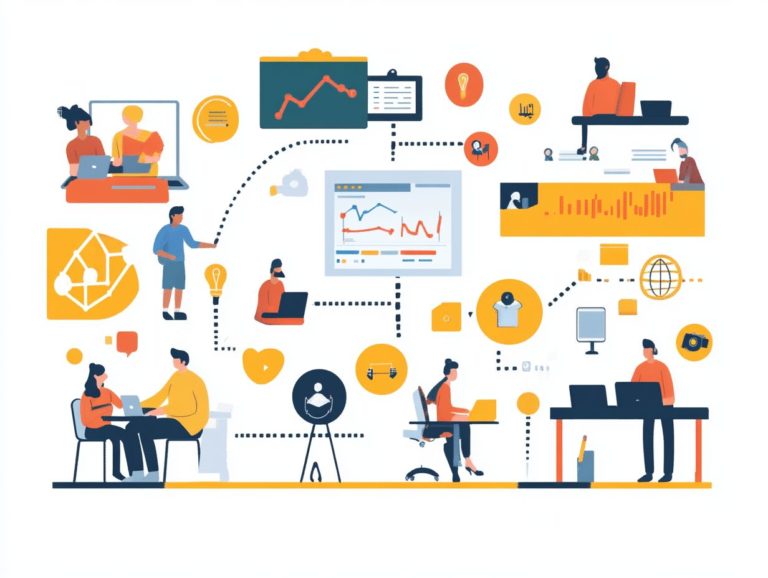The Role of Emotional Intelligence in Skills Development
Emotional intelligence (EI) isn’t just a buzzword; it’s a vital skill that can change your personal and professional life for the better!
This article delves into the definition and components of EI, emphasizing its importance in cultivating vital skills and the myriad benefits it offers. It also provides you with practical strategies for enhancing your emotional intelligence and explores its impact within the workplace.
Whether your goal is to elevate your career or enrich your personal relationships, grasping the nuances of EI is crucial for unlocking your full potential.
Contents
- Key Takeaways:
- Understanding Emotional Intelligence
- The Importance of Emotional Intelligence in Skills Development
- Ways to Improve Emotional Intelligence
- Emotional Intelligence in the Workplace
- Frequently Asked Questions
- What is emotional intelligence and how does it relate to skills development?
- How does emotional intelligence impact the learning process?
- Can emotional intelligence be taught and developed?
- What are some ways to incorporate emotional intelligence into skills development programs?
- How does emotional intelligence contribute to leadership development?
- What are the benefits of having a high level of emotional intelligence in the workplace?
Key Takeaways:

- Emotional intelligence is essential for skill development, as it allows individuals to better understand and manage their own emotions, as well as those of others.
- Developing emotional intelligence not only leads to personal growth, but also has a positive impact on professional success by improving communication, decision-making, and leadership skills.
- Practical strategies such as self-reflection, active listening, and empathy can be employed to improve emotional intelligence and create a more harmonious and productive work environment.
Understanding Emotional Intelligence
Understanding emotional intelligence (EI) is essential for your personal and professional growth, especially when it comes to leadership development. EI involves the ability to recognize, understand, and manage your own emotions while being attuned to the emotions of those around you.
This complex idea includes critical components such as self-awareness and self-management. With self-awareness, you can recognize your emotions and grasp how they influence your thoughts and behaviors. For instance, imagine being a leader who can pinpoint stress triggers during high-pressure meetings, allowing you to respond with poise rather than panic.
Self-management means controlling your emotions and reactions in various situations an essential skill for both personal interactions and professional settings. Social awareness gives you the power to empathize with others, fostering valuable connections, particularly within team dynamics.
Lastly, relationship management involves maintaining healthy relationships through effective communication and conflict resolution, which is crucial in any collaborative environment.
The Importance of Emotional Intelligence in Skills Development
The significance of emotional intelligence in skill development has gained considerable recognition, particularly in leadership roles across diverse industries. According to the Future of Jobs Survey 2020 by the World Economic Forum, emotional intelligence stands out as a cornerstone of effective leadership and plays a pivotal role in cultivating essential skills like problem-solving and communication within teams.
As trends in the industry shift, the importance of EI in professional environments becomes even more pronounced, particularly in nurturing a workplace culture that values adaptability and emotional resilience.
Enhancing your emotional intelligence can profoundly influence your ability to adapt and thrive in your career journey, highlighting its critical relevance in both hiring processes and vocational training.
Act now to enhance your emotional intelligence!
How Emotional Intelligence Affects Skill Development

Emotional intelligence plays a pivotal role in skill development by nurturing stronger people skills that elevate workplace culture.
As you cultivate your emotional intelligence, you become more skilled at recognizing and understanding both your emotions and those of your colleagues. This heightened awareness enhances communication and fosters collaboration, essential elements for successfully navigating team dynamics.
Consider a leader with high emotional intelligence; they excel at resolving disagreements and creating an environment where team members feel comfortable expressing their concerns constructively.
Such leaders exhibit adaptability, fine-tuning their management style to cater to the diverse needs of their team. This synergy strengthens relationships among team members and propels organizational success through improved morale and increased productivity.
Benefits of Developing Emotional Intelligence
Developing emotional intelligence brings a wealth of benefits, especially in the workplace, where it can significantly enhance both your success and that of your organization.
For example, when you cultivate high emotional intelligence within your team, you often witness improved dynamics that lead to more effective collaboration. A study by the Consortium for Research on Emotional Intelligence in Organizations reveals that emotionally intelligent teams achieve their goals 20% more effectively than those lacking this awareness.
As a leader, possessing strong emotional intelligence skills allows you to better motivate your team, resulting in a remarkable 30% increase in employee engagement and productivity.
When conflicts arise, your heightened emotional awareness equips you to navigate disagreements skillfully, fostering a supportive atmosphere that ultimately bolsters team cohesion and morale.
Ways to Improve Emotional Intelligence
Ready to boost your emotional skills? Here s how! Improving emotional intelligence requires your intentional effort and the application of well-crafted strategies designed to elevate your self-awareness and people skills.
This journey involves a thoughtful approach, allowing you to cultivate deeper connections and navigate social dynamics with greater finesse.
Practical Strategies and Techniques
Practical strategies and techniques to enhance your emotional intelligence include exercises aimed at managing your feelings, stress reduction, and cultivating empathy.
By incorporating mindfulness practices like deep breathing and meditation, you can significantly boost your self-awareness and learn to regulate your emotional responses more effectively.
Reflective journaling emerges as a valuable tool, offering you deeper insights into your thoughts and feelings, which in turn fosters personal growth.
Engaging in communication skills training will empower you to articulate your thoughts clearly while honing your ability to listen with empathy. These methods not only enrich your personal relationships but also set the stage for professional success.
As your emotional intelligence improves, you ll find yourself navigating teamwork and conflict resolution with greater effectiveness.
Emotional Intelligence in the Workplace

Emotional intelligence is essential in the workplace, acting as a cornerstone for effective leadership development and improving teamwork among team members.
By harnessing emotional intelligence, you can cultivate a more connected and productive environment, ultimately driving success for your team.
Start your journey to greater emotional intelligence now. Your relationships and career will thank you!
Impact on Professional Success
The impact of emotional intelligence on your professional success is profound, shaping your ability to lead effectively and enhancing your organization s adaptability.
Research indicates that leaders who demonstrate high emotional intelligence can witness a remarkable 20% increase in team performance and a 25% boost in employee satisfaction. This focus on understanding feelings enhances your decision-making skills, allowing you to assess group dynamics and make choices that promote collaboration and innovation.
By adeptly managing conflicts, you can transform potential pitfalls into opportunities for growth, ultimately propelling your organization toward success.
Consider a company that emphasizes emotional intelligence training for its managers; it often reports a significant reduction in turnover rates. This highlights how crucial these skills are for success in fostering cohesive and motivated teams.
Tips for Cultivating Emotional Intelligence in the Workplace
Cultivating emotional intelligence in your workplace demands focused efforts on trust building, coaching, mentoring, and helpful comments that improve performance. These initiatives are essential for improving individual performance and creating a positive work environment.
To truly nurture trust, prioritize open communication, where team members feel empowered to express their thoughts and feelings without the worry of judgment.
Implementing peer coaching programs can significantly elevate understanding feelings, allowing employees to draw valuable lessons from each other’s experiences. Establishing regular feedback mechanisms ensures that insights are not only shared but embraced, helping individuals grasp their emotional impact on others.
Organizations that champion these practices often experience decreased conflict and enriched collaboration among their teams.
Frequently Asked Questions
What is emotional intelligence and how does it relate to skills development?

Emotional intelligence means understanding and managing your own feelings and those of others. It plays a crucial role in skills development as it allows individuals to communicate effectively, solve problems, and build relationships.
How does emotional intelligence impact the learning process?
Emotional intelligence greatly impacts the learning process by helping individuals regulate their emotions and stay focused and motivated. It also enhances understanding and communication with instructors and classmates, leading to a more positive and effective learning experience.
Can emotional intelligence be taught and developed?
Yes, emotional intelligence can be taught and developed through methods such as self-reflection, seeking feedback, and practicing emotional regulation techniques. It is a skill that can be continuously improved with effort and practice.
What are some ways to incorporate emotional intelligence into skills development programs?
Incorporating activities that promote self-awareness, empathy, and effective communication can help develop emotional intelligence in skills development programs. Providing a supportive and inclusive learning environment also contributes to its development.
How does emotional intelligence contribute to leadership development?
Emotional intelligence is a crucial component of effective leadership, as it allows leaders to understand and manage their own emotions and those of their team members. It also helps in building strong relationships and managing conflicts effectively, leading to a more cohesive and successful team.
What are the benefits of having a high level of emotional intelligence in the workplace?
Having a high level of emotional intelligence in the workplace can lead to better teamwork, communication, and decision-making. It also promotes a positive work culture and helps manage stress and conflicts effectively, leading to increased productivity and job satisfaction.
Start developing your emotional intelligence today for a better workplace!






